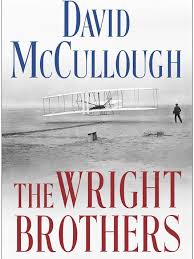Wrights’ Special Genius
Few Americans are as famous – and perhaps less well-known – than the Wright brothers. Wilbur and Orville’s discovery of controlled flight is an extraordinarily inspirational tale, told in schools and popular history. We all know that the brothers were close, that they had a bicycle shop, were engineers and tinkerers, and that their first controlled flight was in Kitty Hawk, North Carolina. It’s so ingrained in our culture that it is on North Carolina’s license plate. The Wright brothers achieved something that has truly transformed the world.
But what do we know about them as people? And just how, exactly, did these two self-taught inventors from Dayton, Ohio, pull it off?

David McCullough, perhaps the nation’s most widely-read non-fiction writer of history, tackles the question in The Wright Brothers. McCullough is an extremely skilled writer who has been authoring best-selling prize-winning books for decades. His prose flows beautifully and he has an innate sense of when to move things along and when to linger. His work is accessible and grounded in meticulous research.
In The Wright Brothers, McCullough humanizes the brothers, along with their father and sister Katherine. They were driven, intense, and private – and quite unusual people. Wilbur was the more cerebral and controlling. Orville was more entrepreneurial. Brilliant, smart and obsessed, they lived their lives with a discipline and work ethic that was off the charts. McCullough cannot explain why, but he can show us how. He also highlights circumstances that directed the brothers’ path.
Wilbur was an outstanding student in high school with plans to attend Yale. That all changed when he was hit with a hockey stick and badly disfigured. The culprit was a fellow student who later murdered his family and was executed by the state of Ohio. The event altered Wilbur’s life, who remained at home for three years after the incident, reading and studying – all on his own.
Orville’s direction was also changed by a life-threatening illness. In his mid-twenties, as the brothers were building their bicycle business, Orville fell ill with typhoid. He nearly died. As he recovered, Wilbur read to him – and they spent a great deal of time discussing the works of Otto Lilienthal, a German aerialist. The experience bonded the brothers in conquering the challenge of controlled flight.
McCullough does outstanding work clarifying the methodical manner in which the brothers pursued their passion. He explains how they experimented, their research, their teamwork, and sheer persistence. The setbacks were many and the brothers did not seek, nor receive, much external support. Their success was a triumph of brains, dedication, and deliberation. The Wright brothers were quintessential engineers.
The Wright Brothers is a very good book. It is pleasure to read and I gained a new appreciation of the Wright brothers. The leadership of the City of Chicago made a very good call in 1934 naming a new community college after Wilbur Wright. He and Orville are well-deserving of many honors and our continued attention.
David Potash